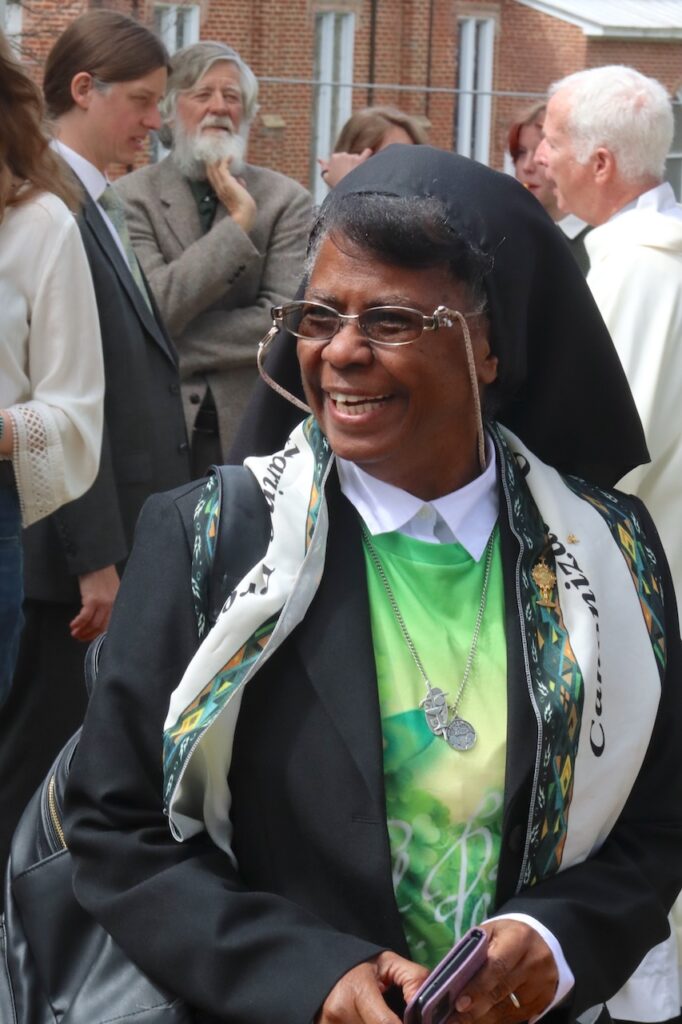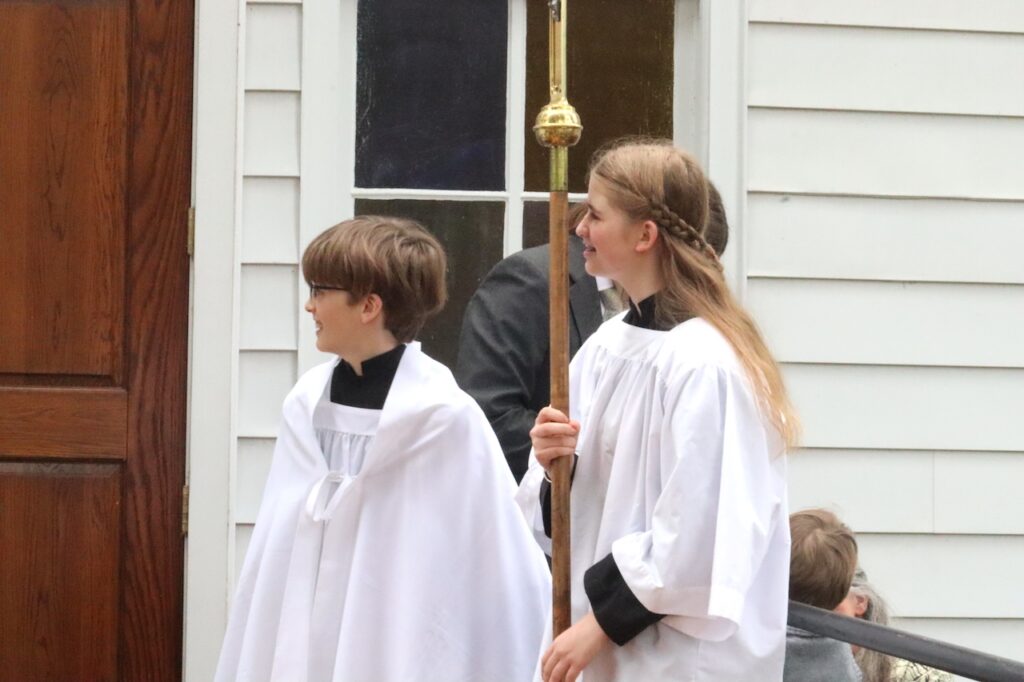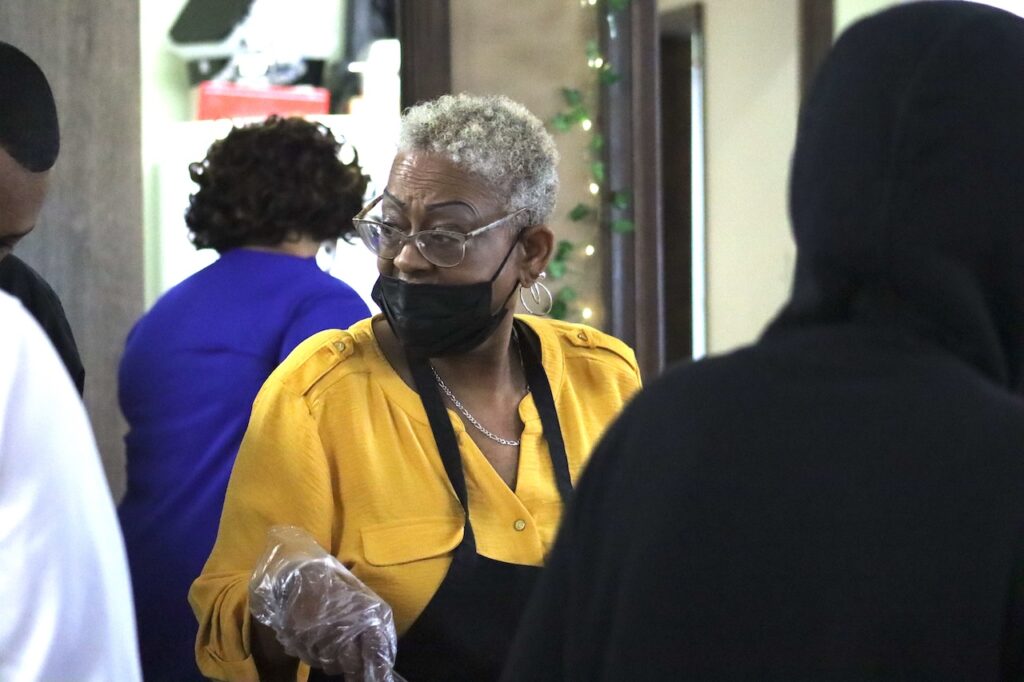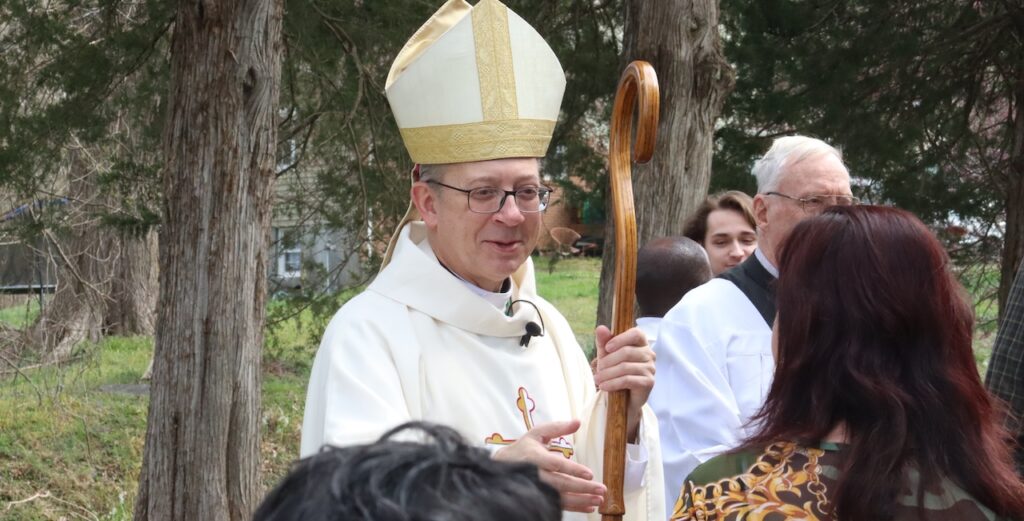St. Joseph’s Shrine of St. Katharine Drexel, Columbia (St. Joseph), has roots so deep they stretch back 140 years. Since 1884, this small church has been a place of peace and a refuge from racism, welcoming all who walk through its doors.
Rich in history, it is comprised of more parishioners than the tiny town of Columbia has residents, and features one of only two shrines to St. Katharine Drexel in the country. On Sunday, March 17, Bishop Barry C. Knestout presided over a 140th anniversary Mass, along with the pastor, Father David Ssentamu. With incense lingering in the air, every pew in the chapel was filled. After Mass, parishioners gathered to dance, sing and eat.
Father Richard Wakeham built the small chapel for his parents in 1884, who previously had to travel to Richmond for Mass as there were no Catholic churches nearby. The Wakeham Chapel, as it was then known, helped convert dozens of nearby residents to Catholicism. It also invited Black residents to worship, which was rare in the Reconstruction-era South.
Father Wakeham celebrated Mass there until his parents died and he was transferred to Boston in 1892. The chapel sat unused for years, until a soon-to-be saint stepped inside.
Parish revived
Mother Katharine Drexel was riding in a train when she saw it: a small gilded cross, shining in the distance atop a hill. There weren’t many Catholic churches in the rural South at the turn of the 20th century, and that shimmering cross intrigued her.
On her way back through Virginia, she stopped to investigate and found Zach Kimbro, better known in town as “Uncle Zeke,” busy sweeping the floor. He explained that he did this every day out of respect for the Wakeham family. He also prayed every day for Mass to return to Columbia. Soon his prayers were answered in more ways than one.
Mother Katharine had long been concerned about social inequality and racial injustice. Though she was born a wealthy heiress, she left her life of luxury to become a religious sister. She also donated her fortune to fund missions she championed.
In Columbia, in addition to making sure priests returned, she also built a schoolhouse for local Black children, as they were denied admittance to public schools. She brought with her the Sisters of St. Joseph, and eventually, the chapel became known as St. Joseph’s Chapel. The one-room schoolhouse served elementary and middle school children for decades.
Mother Katharine is now known as St. Katharine Drexel, the patron saint of racial justice and philanthropists, and one of the first saints born in the United States. In Columbia, a shrine was built in her honor, and after St. Katharine was canonized in 2000, the church was renamed St. Joseph’s Shrine of Saint Katharine Drexel by Bishop Walter F. Sullivan.
Living link with history
In contrast to St. Katharine, missionary Lydia O’Hare Nicholas was not an heiress, but the daughter of freed slaves. She taught at the schoolhouse for nearly half a century.
She also cooked for the priests, prepared students for the sacraments, tended the grounds, cleaned the linens, and the list goes on. Her dedication to her students, community, and faith was even recognized by the Vatican. Nicholas was awarded the highest honor a lay woman can earn: the Pro Ecclesia et Pontifice, a papal medal of honor.
Her descendants continue her legacy with their work in the community. Barbara Jackson is Nicholas’ great niece, and, at 86, is now considered by many as the matriarch of the parish. Jackson remembers “Aunt Liddy” fondly, and was instilled with the importance of education from a very young age.
She recalled how her great-grandmother was one of the first converts when Mother Katharine came and how the rest of the family followed her lead. Her Uncle Fred, who was her Aunt Liddy’s husband, built the school. The majority of her large family attended the church or school there.
“I remember when we were related to everyone who went to the church. I have a long history there, and a lot of love,” Jackson said.
She especially remembers her mother’s love of the church and how proud she was of being Catholic, something Jackson carries with her to this day.
“My mom was devoted to it, she really was. Every story she told came back to St. Joe’s,” she shared. “I wish I had listened more when I was a kid. But I am devoted, too. I’m not going anywhere. Someone will have to carry me out.”
A parish family
Melissa Kenney has been a parishioner for 17 years and acts as a historian for the parish. She was also the chair of the anniversary committee. Kenney moved to St. Joseph from Fredericksburg, where she attended a church with 10,000 members and four resident priests. Joining St. Joseph was a big change, but a welcome one.
committee. Kenney moved to St. Joseph from Fredericksburg, where she attended a church with 10,000 members and four resident priests. Joining St. Joseph was a big change, but a welcome one.
“Everyone who goes here is here because they want to be,” she said. “There is a genuine feel of a true ‘parish family,’ more than any other parish I have ever attended. Maybe it’s because we are small, but we do look out for one another and support each other. It’s a beautiful thing.”
Will Kulick also served on the anniversary committee and has been a member of St. Joseph for 12 years. He came from another small country church and was immediately drawn to the tight-knit community he found at St. Joseph, noting that many parishioners became lifelong friends.
Kulick ministers to prisoners at the women’s correctional facility in Goochland, along with Father Ssentamu, who brings the Eucharist and other sacraments to the women.
“What I appreciate about Father David is his willingness to call us to be better, and he includes himself in that,” said Kulick. “He labels himself as the one in need of the most help. He’s in the same boat with us.”
Kulick treasures the history of the parish, explaining that “it’s a point of real concrete relation to our past to know we really did have a saint participate in getting us to where we are today.”
A universal parish

Many parishioners believe that inclusivity has been key to St. Joseph’s growth and longevity over the last 140 years.
“We have multiple generations, families, and demographics represented, and we all come together each Sunday for the Eucharist,” said Kenney. “You can’t get any better than that!”
During his homily at the anniversary Mass, Bishop Knestout paid homage to the parish, saying, “It is this parish church, this community, that has provided the context and setting for generations to see and hear the Lord. Walking with him in friendship, knowing him face to face, sharing the joy of this community.”
The bishop also spoke of how Uncle Zeke’s, and later Mother Katharine’s, “prayers were heard and answered, and have been celebrated and nurtured here ever since.”
The Mass was the last of several events held by the parish over the past jubilee year, including a youth art contest, parish homecoming, concert and Eucharistic procession.
“My hope is the parish continues to thrive and flourish,” said Kenney. “It really is a Catholic parish – in the true sense of the word, ‘catholic’ meaning universal.”
“I also hope that this anniversary celebration helped our community understand the fascinating and beautiful history that we have, and that, along with the faith, we continue to hand it down,” she added.

